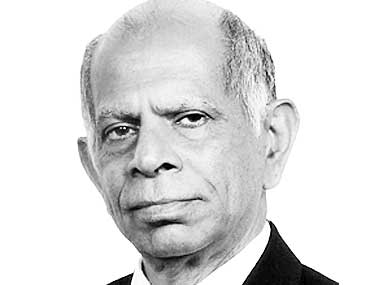Prime Minister Netanyahu tried to move heaven and earth, including Washington, to get the approval of the Knesset for annexing a part of the West Bank—details are yet to be revealed—by 1st July. He has failed. He could not get his Cabinet to agree on what to take to the Knesset. However, he will persist. We do not know, and perhaps even he does not know, whether he would succeed. President Trump did not give the green signal for the July 1st deadline.
Netanyahu has the option to call for a new election. Opinion polls suggest Netanyahu might win handsomely in a fresh election, the fourth one after April 2019. He failed to get enough seats to be Prime Minister in the three held so far. He also has the Damocles’ sword of corruption charges hanging over him.
If the planned annexation goes through it will have seriously adverse and lasting consequences for Israel, for the Palestinians still without a state envisaged in the 1947 U.N. Partition plan, reaffirmed in the two Oslo Accords (1993 and 1995) and in various UN Security Council Resolutions, and for the region. Though the details are yet to be out, a look at the map below will help a little in understanding Netanyahu plan.

The Netanyahu plan has come under severe criticism from U N Secretary General and others. António Guterres called Israel’s U.S.-backed plans to annex parts of the West Bank a “water- shed moment” and urged Israel to reconsider undermining ‘the two-state solution’ and destabilizing the area. He also called on Israel and Palestine to come back to the table to work to find a ‘two-state solution’ as defined by international law under the pre-1967 borders that Israel seized during the Six-Day War.1
The European Union does oppose the plan. 1085 EU MPs from 25 countries have made a public appeal to Netanyahu to abandon the plan. The appeal states, “We are profoundly concerned about the impact of annexation on the lives of Israelis and Palestinians, as well as its destabilizing potential in a region on our continent's doorstep.”2
Germany is Israel’s strongest supporter in Europe for understandable reasons including the guilt the Germans feel for the Holocaust under Hitler. Chancellor Angela Merkel said in 2008 that Israel’s security is a national interest for Germany. Foreign Minister Heiko Maas, who once said that he entered politics because of Auschwitz3, visited Jerusalem on 10th June to urge Netanyahu to withdraw his plan. Of course, he drew blank.4
Seven European nations - Belgium, Britain, Estonia, France, Germany, Ireland and Norway - in a joint statement warned annexation would "severely undermine" prospects for resuming the Middle East peace process. 5
The Arab League has also opposed the annexation plan. Egypt, Jordan, and U.A.E. have warned Israel of the adverse consequences if it goes ahead. The U.A.E. Ambassador to Washington even got published his article opposing the plan in Hebrew in an Israeli paper in.
Jordan and Egypt are the only two Arab countries that have signed peace treaties with Israel based on the assumption that there would be a just and fair settlement of the Palestinian Question. King Abdullah II of Jordan has reportedly stopped taking Netanyahu’s calls. Netanyahu sent the Mossad chief Yossi Cohen to meet the King, but the King remains firm. Even if the Jordan Valley is left out of the annexation, Jordan will not accept the Netanyahu plan.
We should also take note of opposition within Israel. The letter from 1085 EU MPs referred to above was written in response to a request from “four prominent Israeli figures, including Avraham Burg, a former Speaker of the Knesset, and Michael Ben-Yair, a former Attorney General of Israel.” 6
The security establishment in Israel is opposed to the plan since if the Palestinians start another intifada and or the Hamas starts sending rockets from Gaza, Israeli defence forces would find it difficult to face the situation. Moreover, the establishment is worried that if the annexation takes place Israel’s current anti-Iran front with the Arabs might be undermined.
Essentially, the opponents to the annexation are telling Netanyahu:
- Such annexation would be illegal as under international law occupied territory cannot be annexed.
- By annexing territory as planned, irrespective of the size thereof, the chances of a ‘two-state solution’ would be destroyed.
- The regional peace and stability will be adversely affected.
The ‘two-state solution’ is a convoluted expression. As already mentioned, the 1947 Partition Plan was for two states Israel and Palestine with Jerusalem as the shared capital. Israel got 56% of territory allotted to it, but eventually after the 1947-49 war between Israel and the Arabs, Israel added more territory. No State of Palestine was established. Jordan held the West Bank and Egypt the Gaza. These two territories were captured by Israel in the 1976 Six-Day War. Hence, they are territories occupied by the victorious party after war.
As per the Oslo Accords, Palestinians were given a restricted autonomy in West Bank and Gaza. There was a clause for a Palestinian state to be established following negotiations between the two sides on the boundary and other issues such as the right of the Palestinians to return from areas they were expelled or fled from for safety in the 1948-49 war.
Israel has been slow in engaging in such negotiations and started permitting Israeli settlements outside the state in Palestinian territories starting from 1972. In 1979 the Security Council by Resolution 446 of 22nd March 1979 affirmed that “that the policy and practices of Israel in establishing settlements in the Palestinian and other Arab territories occupied since 1967 have no legal validity and constitute a serious obstruction to achieving a comprehensive, just and lasting peace in the Middle East…”, with only three abstentions (U.K., U.S., and Norway). Israel defiantly declared Jerusalem as the ‘eternal and indivisible capital”.
Israel went on increasing and expanding the settlement despite the repeated demands from the Palestinians. President Obama demanded a freeze, Israel said yes, but cheated and got away scot-free thanks to the clout of the pro-Israeli lobby in U.S. The strategy of Israel has been to do what it wants and expect the world to accept the fait accompli.
President Trump’s election in 2016 gave a golden chance to Netanyahu to promote his annexation plans. Trump asked his son-in-law Jared Kushner to come out with a plan for peace between the Israelis and the Palestinians. Kushner has the advantage of not knowing much about the complex history of the Israeli-Palestinian dispute.
Initially, the Palestinians welcomed Trump’s intention to find a solution. Trump took a number of actions calculated to hurt the Palestinians. He moved the U.S. Embassy to Jerusalem and closed down the P.L.O. office in Washington (May 2018); and in September 2018, he cut funding to UNRWA (United Nations Relief and Works Agency for Palestinian Refugees in the Near East). The Palestinians declared that U.S. was no longer an impartial mediator. They refused to meet with Kushner.
The Kushner Report that Trump described as the Deal of the Century came out in two parts. The first part proposing investment in the Palestinian territories for economic development and building up infrastructure came out in June 2019. Kushner’s calculation was that the Palestinians would eagerly accept it. He was wrong. The political part came out in January 2020 envisaging Israel’s taking over about 30% of the West Bank, with some compensation elsewhere; the Palestine will be a ‘demilitarized state’ with a capital somewhere close to Jerusalem. Israel will control its borders and air space.
In plain English, Palestine will not be state, but a municipality. The vocabulary of a ‘two-state solution’ is utterly confusing. Trump intends to have a state and a municipality.
Trump has entered the lame-duck phase of his presidency. Netanyahu’s chances are not bright. Even some Republican lawmakers in U.S. have opposed the annexation plan. Joe Biden, the Democratic nominee for President, has opposed it.
In short, has Netanyahu succeeded in dismantling the solid bipartisan support for Israel in U.S.? May be!
References
- https://www.foxnews.com/world/un-secretary-general-demands-israel-renounce-west-bank-annexation-plans
- https://www.euronews.com/2020/06/24/more-than-1-000-european-mps-call-for-israel-annexation-to-be-halted-and-warn-of-consequen
- https://www.britannica.com/place/Auschwitz Auschwitz in Poland was the biggest concentration camp under Nazi Germany. The number killed is between 1.1 to 1.5 million.
- https://www.timesofisrael.com/ahead-of-possible-annexation-german-fm-comes-to-israel-with-a-delicate-mission/
- https://www.aljazeera.com/news/2020/06/arab-league-call-israel-drop-annexation-plans-200624142029201.html
- https://www.euronews.com/2020/06/24/more-than-1-000-european-mps-call-for-israel-annexation-to-be-halted-and-warn-of-consequen
(The paper is the author’s individual scholastic articulation. The author certifies that the article/paper is original in content, unpublished and it has not been submitted for publication/web upload elsewhere, and that the facts and figures quoted are duly referenced, as needed, and are believed to be correct). (The paper does not necessarily represent the organisational stance... More >>
Image Source: https://foreignpolicy.com/wp-content/uploads/2020/04/benjamin-netanyahu-israel-palestina-west-bank-annexation-1167234607.jpg?resize=800,537&quality=90










Post new comment